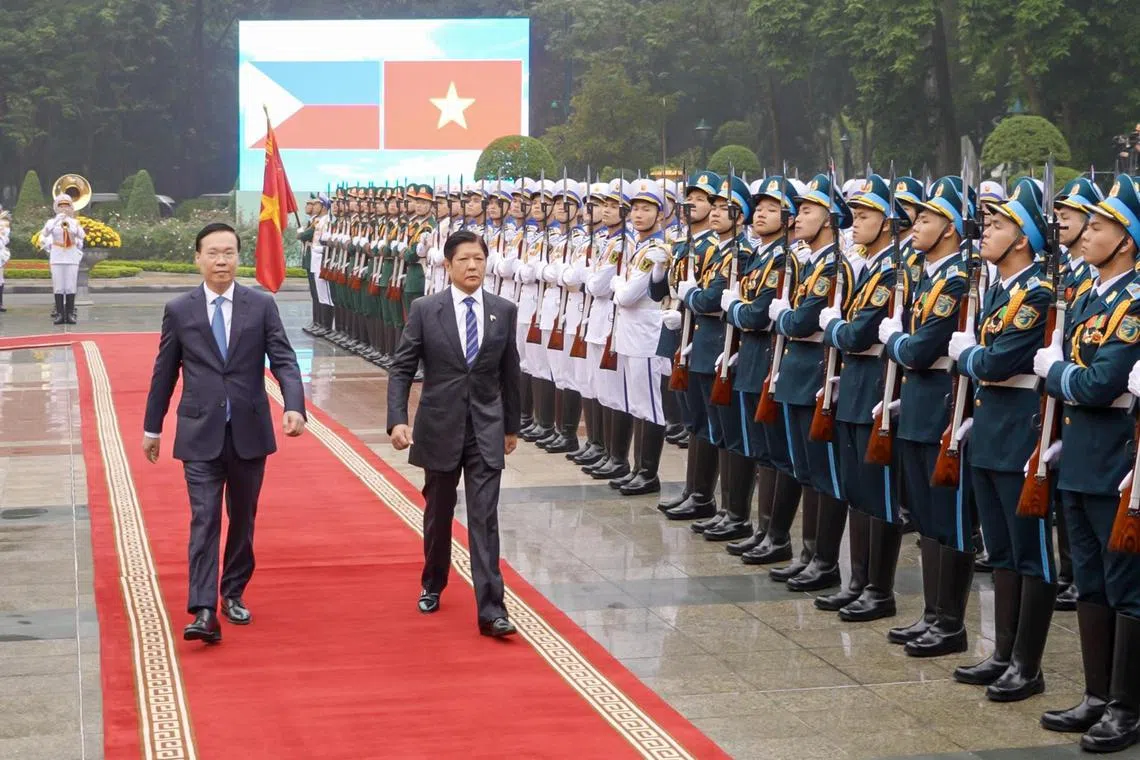Philippines, Vietnam agree to cooperate in South China Sea amid a more assertive Beijing
Sign up now: Get insights on Asia's fast-moving developments

Vietnam’s President Vo Van Thuong (left) welcoming his Philippine counterpart Ferdinand Marcos Jr at the presidential palace in Hanoi on Jan 30.
PHOTO: THE PHILIPPINES' PRESIDENTIAL COMMUNICATIONS OFFICE
MANILA – The Philippines and Vietnam on Jan 30 forged deals to bolster their maritime cooperation in the South China Sea,
The countries signed two memorandums of understanding (MOUs) during Philippine President Ferdinand Marcos Jr’s two-day state visit to Hanoi.
The first seeks to prevent untoward incidents in the South China Sea, with both sides agreeing to intensify efforts to “promote trust, confidence and understanding through dialogue and cooperative activities”.
The second MOU aims to improve cooperation between the two countries’ coast guards, including setting up a direct hotline communication mechanism between them.
Beijing claims sovereignty over almost the entirety of the South China Sea, including parts of the exclusive economic zones of the Philippines, Vietnam, Malaysia, Brunei and Indonesia. The Permanent Court of Arbritration in 2016 ruled that China’s claims had no legal basis.
Beijing has refused to recognise this ruling and has instead ramped up its military presence and artificial island-building activities in the South China Sea.
As a result, ties between the Philippines and China have deteriorated, with Chinese vessels shadowing and firing water cannon at Philippine ships taking supplies to troops stationed at a remote military outpost on the Second Thomas Shoal.
On Jan 12, Chinese Coast Guard personnel were also caught on video chasing Filipino fishermen who were collecting sea shells near Scarborough Shoal.
In his meeting with Vietnam’s Prime Minister Pham Minh Chinh, Mr Marcos said the Philippines is committed to partnering with a “like-minded state” like Vietnam to ensure a rules-based international order in the Asia-Pacific region.
“As maritime nations, we share a similar assessment of the current state of our regional environment with other maritime nations of the Asia-Pacific. Our countries have crucial roles to play in shaping the regional security discourse and in upholding the rules-based international order,” he said.
The Chinese Embassy in Manila did not respond to queries about the signed agreements.
The pacts will allow both South-east Asian nations to “enhance confidence-building measures” to improve conditions along their maritime border, said defence analyst Don McLain Gill of the De La Salle University in Manila.
He said they could also pave the way for a potential breakthrough similar to what Vietnam achieved with Indonesia in 2022 to set and agree the boundaries of their exclusive economic zones within the South China Sea.
Manila and Hanoi have overlapping claims in parts of the South China Sea, including the Spratlys archipelago which is considered the traditional fishing ground of Filipino and Vietnamese fisherfolk.
“Such a breakthrough will be crucial for strengthening the value of international law in the tumultuous waters of the greater South China Sea and the West Philippine Sea in particular,” said Mr Gill, using the term with which Manila refers to parts of the South China Sea that lie within the country’s exclusive economic zone.
The latest agreements also show it is possible for countries with competing interests in the South China Sea to find areas of cooperation to deal with a more influential and powerful neighbour like Beijing, said maritime security expert Collin Koh of the S. Rajaratnam School of International Studies.
“Perhaps we might not reach unanimity on the South China Sea among all 10 members (of Asean), but we can at best seek convergences. So I think this latest set of agreements between the Philippines and Vietnam appears geared towards that aim,” said Dr Koh.
He said the pacts will also allow Manila and Hanoi to be more strategic in harnessing their scarce resources and capacities “where they’re most needed”, as they deal with China’s superior maritime forces.
If all goes well, said the two analysts, the Manila-Hanoi pacts could help Asean finalise the long-delayed code of conduct (COC) in the South China Sea that it has been negotiating with Beijing.
“Hopefully this helps in the code-of-conduct discussions at the intra-Asean level concerning various issues, before the bloc sits at the table with China,” said Dr Koh.
In 2023, Mr Marcos began wooing Vietnam and Malaysia to create a separate COC, citing the slow negotiations between Asean and Beijing.
At the meeting with Mr Marcos, Mr Chinh said that claimants in the South China Sea should work on an “effective and substantive” Code of Conduct that complies with international laws, in particular the 1982 United Nations Convention on the Law of the Sea (Unclos).
The 2016 tribunal ruling that rejected Beijing’s nine-dash line claim was based on the Unclos.
The agreements, however, are just a start to grow trust between the Philippines and Vietnam, with analysts saying it is still too early to conclude just how united the duo would be against Beijing.
“Vietnamese foreign policy would prevent such an eventuality, unless it is a drastic resort as a result of certain Chinese behaviour that could push Hanoi towards that direction. Until then, I’ll think Vietnam will seek to avoid giving Beijing the impression that it’s ‘ganging up’ with Manila against it in the South China Sea,” said Dr Koh.
Mr Gill said that for now, Manila and Hanoi have signified their acknowledgement of the need to “work more closely together amid the uncertainties of regional politics”.



